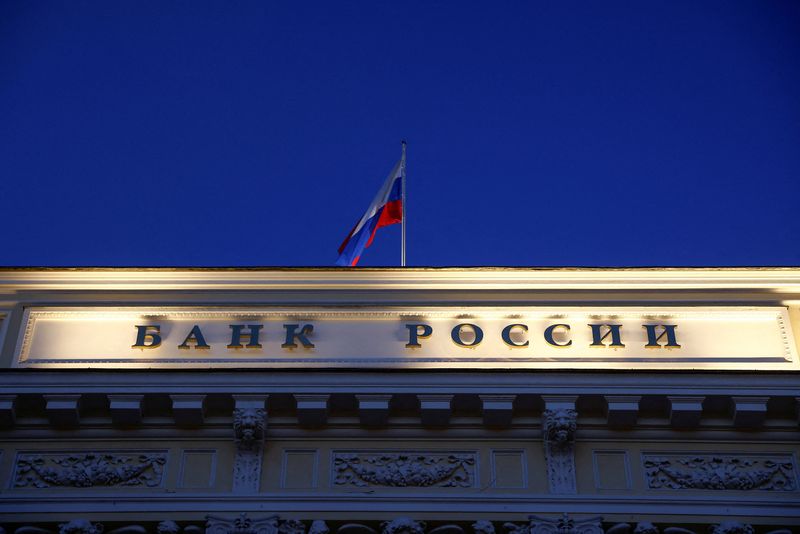LONDON (Reuters) - The West has imposed an unprecedented package of sanctions on Russia, its top companies and its business and political elite in response to Moscow's invasion of Ukraine.
The measures have triggered an exodus of foreign firms, raised the prospect of Russia defaulting on its sovereign debt, and look set to trigger a deep economic contraction.
Here is a summary of the main financial sanctions:
CENTRAL BANK ASSETS FROZEN
The Group of Seven major Western powers have banned transactions with Russia's central bank and frozen its assets held in their jurisdictions – around $300 billion, according to Russian Finance Minister Anton Siluanov.
Moscow has called the move "theft", having for years touted its mammoth reserves as a war chest that would protect the economy against Western sanctions or a sharp downturn.
Russia's overall gold and foreign currency reserves - including the frozen funds - stood at $593.1 billion as of April 29.
The United States has also barred Russia from using frozen reserves to make bond payments to foreign holders of Russia's sovereign debt.
INVESTMENT
The United States has banned American companies from making new investments in Russia. The EU has outlawed new investments in Russia's energy sector.
Several state investment vehicles such as the Russian Direct Investment Fund and the state development bank VEB have been sanctioned, prohibiting Western investors from dealing with them.
The United States has banned the secondary-market trading of Russian government debt issued since March 1. Previous sanctions put in place in 2019 had already limited Westerners' ability to invest in Russia's government debt on the primary market.
Britain banned Russian sovereign debt placements in London and the EU has also restricted trading in Russian government bonds.
Russia has around $40 billion of outstanding debt denominated in euros and dollars.
Foreign investors hold half of this, and also around 18% or 2.8 trillion roubles ($45 billion) of Russian domestic bonds, called OFZs.
BANKING
The United States has placed "full blocking sanctions" on several Russian banks and financial institutions, including the state-owned lenders Sberbank and VTB Bank, which together account for around half of Russia's banking assets.
The restrictions effectively block them from dealing in U.S. dollars and ban Western firms from carrying out transactions with them.
The EU has kicked seven Russian banks, including state-owned VTB Bank and Otkritie Bank, also state-owned, off the SWIFT financial communications messaging system, hampering their ability to conduct cross-border transactions.
EU Commission chief Ursula von der Leyen said on May 5 that the bloc intended to eject Sberbank from SWIFT in its next sanctions package.
PERSONAL SANCTIONS
Hundreds of members of Russia's political and business elite have been added to U.S. and EU sanctions lists – a move that freezes their assets and bans them from travelling there.
Sanctions have notably been imposed on President Vladimir Putin and his cabinet, including Foreign Minister Sergey Lavrov, Prime Minister Mikhail Mishustin and Kremlin spokesperson Dmitry Peskov and their families.
Top executives at Russia's largest state-run companies including Sberbank CEO German Gref have also been sanctioned, resulting in more than $30 billion of asset seizures in the EU, the bloc said.

Oligarch Roman Abramovich was forced to sell Chelsea Football Club after Britain put him on its sanctions list.
($1 = 62.2500 roubles)